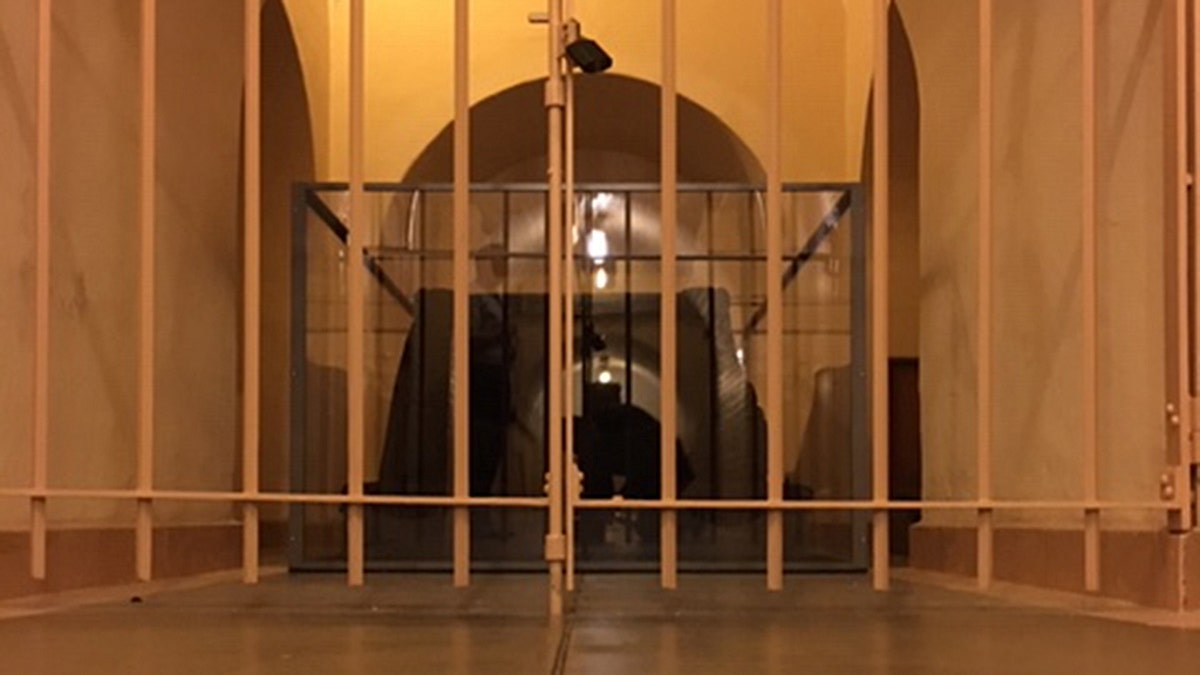House Democrats hold Barr in contempt, Trump asserts executive privilege over Mueller report
Reaction and analysis from former deputy assistant attorney general John Yoo and former independent counsel Sol Wisenberg.
Attorney General William Barr is awaiting a House vote to hold him in contempt of Congress. The same could be in the offing for former White House Counsel Don McGahn and perhaps others.
The House Judiciary Committee voted to hold Barr in contempt of Congress for failing to provide Congress with the full, unredacted Mueller Report. The measure must still head to the floor before the House actually slaps Barr with a contempt citation.
HOUSE PANEL VOTES TO HOLD BARR IN CONTEMPT, AS TRUMP ASSERTS EXECUTIVE PRIVILEGE OVER MUELLER FILES
When Congress holds someone in contempt, it usually spurs a protracted and unsatisfying court fight. In the old days, Members of Congress used to arrest someone held in contempt and hold the individual themselves.
“Contempt of Congress” can take three forms. There’s civil contempt, criminal contempt and inherent contempt.
Civil contempt means the House or Senate files a lawsuit to pry loose the information or testimony it lacks. Criminal contempt involves sending the resolution to the Justice Department for prosecution of the uncooperative individual.
And then there’s inherent contempt. This is where Congress doesn’t mess with the federal judiciary or the executive branch to help exercise its own authority. Congress enforces the contempt resolution under its own power vested by Article I of the Constitution.
“My favorite,” said Rep. Jamie Raskin, D-Md., when talking about inherent contempt.
The authority for contempt of Congress dates back to customs in the English parliament and in colonial legislatures. Congress deployed its own contempt power early on.
In 1795, three House members believed that two men, one named businessman Robert Randall, attempted to bribe them. The House decided the second man was innocent. But the House found Randall in contempt. Randall was brought to Congress and reprimanded by Speaker Jonathan Dayton of New Jersey. Randall was ordered held in House custody for a few days.
In 1800, the Senate found journalist William Duane in contempt for news articles he wrote about the Senate committees. The Senate arrested Duane and held him for several weeks.
Naturally, some people thought the Congressional contempt power went too far. The debate prompted a Supreme Court case. But the High Court ruled in 1821 that Congress had the authority to exercise its own power of contempt – which may include arrest and detention.
Even so, Congress hasn’t arrested someone for contempt of Congress since 1934.
Lawmakers investigated the 1930 Air Mail Scandal and whether the Hoover Administration improperly handed out contracts to airlines to deliver mail. William MacCracken served as President Herbert Hoover’s Assistant Secretary of Commerce. MacCracken presided over a meeting which set up the mail contracts. MacCracken didn’t cooperate with the Senate. So the Senate voted to hold MacCracken in contempt and arrested him.
This is where things get interesting.
The Senate held MacCracken for ten days. Not in a Congressional jail, but at the posh Willard Hotel in downtown Washington.
There were suggestions that Congress could be forced to hold figures in contempt during the Watergate investigation of the mid-1970s. Watergate Committee Chairman Sen. Sam Ervin, D-S.C., threatened to jail any witness who didn’t comply with his probe. But it never came to that.
And so contempt of Congress moved to the modern model. Congress would vote to hold someone in contempt and go to court. But that was about it.
Such was the case in 1982 when the House voted to hold EPA Administrator Anne Gorsuch Burford (the mother of Supreme Court Justice Neil Gorsuch) in contempt for failing to provide documents related to Superfund sites.
Congress has dipped its toes into the contempt waters four times in recent years. The Democratic House cited White House Chief of Staff Josh Bolten and Counsel Harriet Miers with contempt of Congress in 2008 during the George W. Bush administration. The Republican House rapped Obama administration Attorney General Eric Holder with contempt in 2012. The GOP House also voted to hold former IRS employee Lois Lerner in contempt of Congress in 2014.
NADLER ONCE CALLED HOLDER CONTEMPT VOTE 'SHAMEFUL' NOW LEADS CHARGE AGAINST BARR
Congress attempted unsuccessfully to persuade the Obama Justice Department to prosecute Holder and Lerner. But all four contempt of Congress citations involved civil contempt. Each initiated lawsuits. They culminated in less than satisfactory outcomes for those on Capitol Hill supporting contempt.
House Judiciary Committee Chairman Jerry Nadler, D-N.Y., says the House resolution for Attorney General William Barr will be civil contempt, resulting in a lawsuit. But, inherent contempt remains on the table.
Nadler sidestepped a question about inherent contempt when asked why the House wouldn’t pursue something more muscular, considering the flaccid results of other contempt resolutions.
“I don’t want to answer that question because I’m not sure we won’t,” replied Nadler.
House Speaker Nancy Pelosi, D-Calif., also hinted that inherent contempt was on the table - and the consequences which go with it - when speaking at a Washington Post forum a few days ago.
“We do have a local jail down in the basement of the Capitol,” said Pelosi. “But if we were arresting all of the people in the administration, we would have overcrowded jail situation.”
However, the use of that subterranean cell for detention is just folklore.
Deep in the bowels of the U.S. Capitol, two levels directly before the Rotunda floor and precisely in the dead-center of the building, is a small room. Arcades stretch above the floor to form the space. A wrought-iron gate blocks entry from the outside. A black, combination padlock secures the fencing. This is where they intended to bury George Washington. One plan was to build the Rotunda in such a way that so that visitors could look down onto Washington’s grave from above.
But that never happened. Washington is buried at Mount Vernon, 19 miles to the south, along the shores of the Potomac River.

Deep in the bowels of the U.S. Capitol, two levels directly before the Rotunda floor and precisely in the dead-center of the building, is a small room.
There’s no evidence that Congress ever held someone in this space. It sure looks like a jail. But it isn’t.
However, this is Washington, DC. Never never let the facts get in the way of a good story.
Numerous guides, lawmakers and aides have promulgated the myth that the site was once used as a Capitol jail cell.
The Architect of the Capitol’s office even prepared a document titled “Prisons” in the U.S. Capitol. The emphasis focused on the quotation marks around the word “Prisons.” The document declares that “several rooms in the United States Capitol have been used at various times for the detention of offenders.” But the missive adds “it’s not always possible to determine whether these rooms were strictly for custody of prisoners or were used as guard stations.”
The U.S. Capitol Police (USCP) utilizes several “holding rooms” around the complex for persons it detains or arrests. There is a formal lockup at USCP headquarters near the Dirksen Senate Office Building. Officers usually take those arrested to headquarters for processing.
Still, the detention of any figure - particularly someone like Barr - would undoubtedly entail serious preparations. As Attorney General, Barr is sixth in line to the presidency. For the time being, Barr is fifth in line. The Senate has not yet confirmed Acting Defense Secretary Patrick Shanahan for the top slot. Congress would likely have to make special provisions for Barr or any other key officials if lawmakers were to enforce inherent contempt.
That implies some sort of elite arrangement – perhaps along the lines of the Willard Hotel.
CLICK HERE TO GET THE FOX NEWS APP
Reporters pressed Pelosi as to why she thought this contempt effort would be more effective than previous exercises.
“Because I do. I just do,” replied the Speaker. “Do you want to have a contempt of Congress against you? That is not a desirable thing for someone to have.”
The Willard is one thing. But it’s quite another if they actually tossed you in Washington’s tomb for a few days.














































